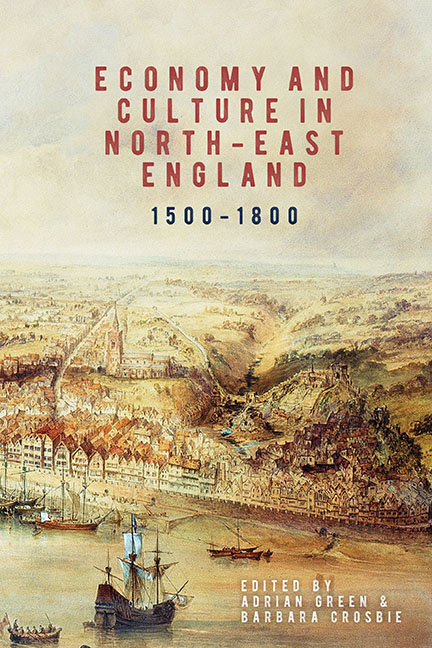Book contents
- Frontmatter
- Contents
- List of Maps, Figures and Tables
- Preface
- Contributors
- Foreword
- List of Abbreviations
- Map
- Introduction: ‘Beyond Coal and Class’: Economy and Culture in North-East England, 1500–1800
- 1 Church Leaseholders on Durham Cathedral's Estate, 1540–1640: The Rise of a Rural Elite?
- 2 Durham Ox: Commercial Agriculture in North-East England, 1600–1800
- 3 Fluctuating Fortunes: The Bowes Family and Lead Mining Concessions, 1550–1720
- 4 Material Matters: Improving Berwick-upon-Tweed's Urban Environment, 1551–1603
- 5 Work before Play: The Occupational Structure of Newcastle upon Tyne, 1600–1710
- 6 Maintaining Moral Integrity: The Cultural and Economic Relationships of Quakers in North-East England, 1653–1700
- 7 Shipping on the Tyne: The Growth and Diversification of Seaborne Trade in the Eighteenth Century
- 8 From Carboniferous Capitalism to Complementary Commerce: Coastal and Overland Trade between North-East England and Scotland, 1580–1750
- 9 Provincial Purveyors of Culture: The Print Trade in Eighteenth- Century Newcastle upon Tyne
- 10 Parish, River, Region and Nation: Networks of Power in Eighteenth-Century Wearside
- Bibliography
- Index
- Volumes Already Published
3 - Fluctuating Fortunes: The Bowes Family and Lead Mining Concessions, 1550–1720
Published online by Cambridge University Press: 13 July 2019
- Frontmatter
- Contents
- List of Maps, Figures and Tables
- Preface
- Contributors
- Foreword
- List of Abbreviations
- Map
- Introduction: ‘Beyond Coal and Class’: Economy and Culture in North-East England, 1500–1800
- 1 Church Leaseholders on Durham Cathedral's Estate, 1540–1640: The Rise of a Rural Elite?
- 2 Durham Ox: Commercial Agriculture in North-East England, 1600–1800
- 3 Fluctuating Fortunes: The Bowes Family and Lead Mining Concessions, 1550–1720
- 4 Material Matters: Improving Berwick-upon-Tweed's Urban Environment, 1551–1603
- 5 Work before Play: The Occupational Structure of Newcastle upon Tyne, 1600–1710
- 6 Maintaining Moral Integrity: The Cultural and Economic Relationships of Quakers in North-East England, 1653–1700
- 7 Shipping on the Tyne: The Growth and Diversification of Seaborne Trade in the Eighteenth Century
- 8 From Carboniferous Capitalism to Complementary Commerce: Coastal and Overland Trade between North-East England and Scotland, 1580–1750
- 9 Provincial Purveyors of Culture: The Print Trade in Eighteenth- Century Newcastle upon Tyne
- 10 Parish, River, Region and Nation: Networks of Power in Eighteenth-Century Wearside
- Bibliography
- Index
- Volumes Already Published
Summary
This chapter analyses the role of the Bowes family as gentry entrepreneurs during a time of precocious economic expansion central to the making of an early industrial north-east region. The Bowes experience has wider implications for our understanding of the early modern lead industry, extending the existing body of literature, while expanding our knowledge of lead mining activity in the north-east region before 1700. Other gentry families, notably the Blacketts in Newcastle and Northumberland, were actively involved in the lead industry, particularly in Allendale, and further south in the dales of North Yorkshire. The Bowes’ activity centred on Weardale and Teesdale, in the bishopric of Durham, where their landed estates lay. As a consequence, the Bowes’ relationship to the institution of the bishopric was crucial in their fluctuating fortunes as lead mining entrepeneurs over the sixteenth and seventeenth centuries. The nature of lead mining in the North Pennines, and the particular institutional context of the bishopric, meant that the Bowes’ lead operation was different from lead mining elsewhere in England and Wales, particularly the free mining lead industry in Derbyshire. The family's parallel engagement with coal mining meant that lead exploitation was an integral part of the region's early industrial expansion, albeit an activity that has always been overshadowed by the more prominent and profitable extraction of and trade in coals.
The Bowes were a Durham gentry family who had connections with the Court and were rewarded with lucrative positions for their loyalty through service to the Crown. Their political prestige and reputation was established during the patriarchy of Sir George Bowes, between 1548 and 1580, when the family adopted Protestantism and assisted in the state centralisation process of the Henrician and Edwardian eras. During Henry VIII's reign Sir Robert Bowes (d. 1555) was made Warden of the Middle March for his defence of hostile Border regions, was a member of the Council in the North and of the Privy Council, and was Master of the Rolls; as the family's patriarch he held the position of Steward of the Crown lordship of Barnard Castle. This extensive influence included an episcopal connection with the bishop of Durham, from whom opportunities were ‘provided for enrichment and local influence’.
- Type
- Chapter
- Information
- Economy and Culture in North-East England, 1500–1800 , pp. 68 - 93Publisher: Boydell & BrewerPrint publication year: 2018

